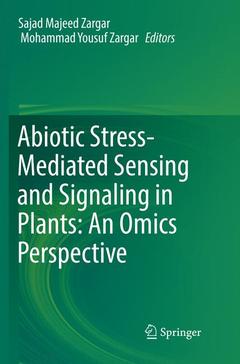Abiotic Stress-Mediated Sensing and Signaling in Plants: An Omics Perspective, Softcover reprint of the original 1st ed. 2018
Coordonnateurs : Zargar Sajad Majeed, Zargar Mohammad Yousuf

The natural environment for plants is composed of a complex set of abiotic and biotic stresses; plant responses to these stresses are equally complex. Systems biology allows us to identify regulatory hubs in complex networks. It also examines the molecular ?parts? (transcripts, proteins and metabolites) of an organism and attempts to combine them into functional networks or models that effectively describe and predict the dynamic activities of that organism in different environments.
This book focuses on research advances regarding plant responses to abiotic stresses, from the physiological level to the molecular level. It highlights new insights gained from the integration of omics datasets and identifies remaining gaps in our knowledge, outlining additional focus areas for future crop improvement research.
Plants have evolved a wide range of mechanisms for coping with various abiotic stresses. In many crop plants, the molecular mechanisms involved in a single type of stress tolerance have since been identified; however, in order to arrive at a holistic understanding of major and common events concerning abiotic stresses, the signaling pathways involved must also be elucidated. To date several molecules, like transcription factors and kinases, have been identified as promising candidates that are involved in crosstalk between stress signalling pathways. However, there is a need to better understand the tolerance mechanisms for different abiotic stresses by thoroughly grasping the signalling and sensing mechanisms involved.
Accordingly, this book covers a range of topics, including the impacts of different abiotic stresses on plants, the molecular mechanisms leading to tolerance for different abiotic stresses, signaling cascades revealing cross-talk among various abiotic stresses, and elucidation of major candidate molecules that may provide abiotic stress tolerance in plants.
Chapter 1. “Omics”: A Gateway Towards Abiotic Stress Tolerance.- Chapter 2. Second Messengers: Central Regulators in Plant Abiotic Stress Response.- Chapter 3. Signaling Peptides: Hidden Molecular Messengers of Abiotic Stress Perception and Response in Plants.- Chapter 4. Reactive Oxygen Species (ROS) – A Way to Stress Survival in Plants.- Chapter 5. Role of Cuticular Wax in Adaptation to Abiotic Stress - A Molecular Perspective.- Chapter 6. Abiotic Stress Response in Plants: A Cis-Regulatory Perspective.- Chapter 7. Multifarious Role of ROS in Halophytes: Signaling and Defense.- Chapter 8. Enhancing Cold Tolerance in Horticultural Plants Using In Vitro Approaches.- Chapter 9. Omics Based Stratagies for Improving Salt Tolerance in Maize (Zea mays L.).- Chapter 10. Drought Stress Tolerance in Wheat: Omics Approaches in Understanding and Enhancing Antioxidant Defense.- Chapter 11. Signalling During Cold Stress And its Interplay with Transcriptional Regulation.- Chapter 12. Cross-Talk Between Phytohormone Signaling Pathways under Abiotic Stress Conditions and Their Metabolic Engineering for Conferring Abiotic Stress Tolerance.
Mohammad Yousuf Zargar, Ph.D, is currently Director Research at Sher-e-Kashmir University of Agricultural Sciences & Technology of Kashmir (SKUAST-Kashmir) in India. He was previously Dean, Faculty of Agriculture; Dean, Faculty of Forestry; Associate Director Research and Associate Dean, Faculty of Agriculture, SKUAST-Kashmir. Prior to that he has worked as Professor-cum-Chief Scientists (Microbiology) at SKUAST-Kashmir. Dr. Zargar has published more than 160 research papers in the scientific journals of national and international repute. He has guided 8 students for the doctoral programme and 6 for the master’s programme.
Date de parution : 12-2018
Ouvrage de 350 p.
15.5x23.5 cm
Date de parution : 03-2018
Ouvrage de 350 p.
15.5x23.5 cm
Thèmes d’Abiotic Stress-Mediated Sensing and Signaling in Plants... :
Mots-clés :
Drought; Stress tolerance; Plant signaling; Genomics; Proteomics



